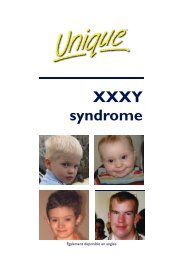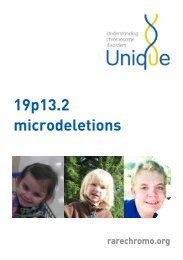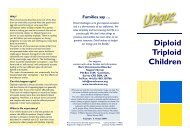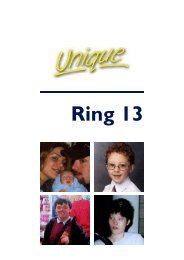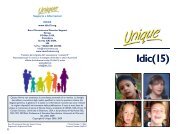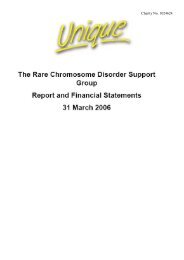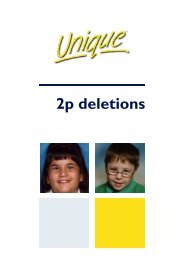15q13.3 microdeletion syndrome - Unique - The Rare Chromosome ...
15q13.3 microdeletion syndrome - Unique - The Rare Chromosome ...
15q13.3 microdeletion syndrome - Unique - The Rare Chromosome ...
Create successful ePaper yourself
Turn your PDF publications into a flip-book with our unique Google optimized e-Paper software.
Behaviour<br />
Some children with <strong>15q13.3</strong> <strong>microdeletion</strong> <strong>syndrome</strong> have behavioural difficulties such as<br />
autistic spectrum disorder or attention hyperactivity deficit disorder<br />
Out of 74 children whose behaviour has been described, 22 have been described with<br />
autistic spectrum disorder (ASD) and 20 with attention deficit hyperactivity disorder<br />
(ADHD), hyperactivity or attention problems. In two studies looking at the behavioural<br />
issues of 25 individuals with a <strong>15q13.3</strong> <strong>microdeletion</strong>, eight had some degree of difficulty<br />
with mood regulation and impulsive behaviours.<br />
Self-injurious behaviour has also been described in three children in a separate study<br />
and anxiety has been described in seven people. A boy with autism is described as being<br />
easy-going and affectionate. At least eight people with a <strong>15q13.3</strong> <strong>microdeletion</strong> have<br />
aggressive behaviour and rages. One boy, who had mild autism, showed aggressive<br />
behaviour and rage. A 38-year-old man with ADHD has severe rages and aggression and<br />
has been diagnosed with schizophrenia (a brain disorder in which there is distortion in<br />
the perception or expression of reality). Schizophrenia has also been described in the<br />
published medical literature. Two fathers described in the medical literature had bipolar<br />
disorder but no other behavioural problems. Bipolar disorder, previously called manic<br />
depression, is a condition that affects a person’s moods, which can swing from one<br />
extreme to another. Someone who has bipolar disorder will have periods or episodes of<br />
depression and mania. <strong>The</strong> two extremes are characterised as depression where the<br />
person feels very<br />
low, and mania<br />
where the person<br />
will feel very high<br />
(International<br />
Schizophrenia<br />
Consortium 2008;<br />
Miller 2008; Sharp<br />
2008; Stefansson<br />
2008; Ben-Shachar<br />
2009; Pagnamenta<br />
2009; van Bon 2009;<br />
Masurel-Paulet<br />
2010; Muhle 2011;<br />
Hoppman-Chaney<br />
2012; <strong>Unique</strong>).<br />
“He is a pretty<br />
normal toddler – plenty of energy and always on the go, jumping from one toy to the next<br />
and not concentrating on anything for more than a few minutes. He is a happy smiley<br />
baby. He can be clingy when other kids are around; wants me to be close. When out in the<br />
playground he is confident to be further away but as soon as another child comes near<br />
him he will race to me and just watch the other kids. He is more of a watcher than a doer.<br />
He is loving and affectionate” – 20 months<br />
“He loves playing with children and adults. He is great at imaginary play and loves all<br />
sports. He loves playing cars and has loved music since he was very young. He loves<br />
animals. He is very active and needs lots of opportunities to move. He is usually good<br />
9



